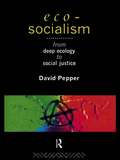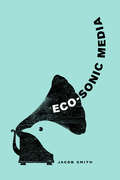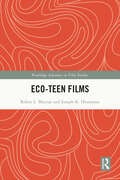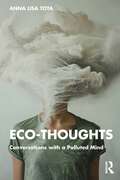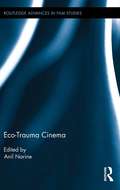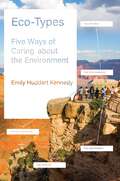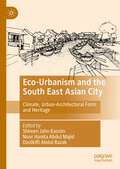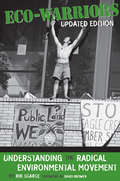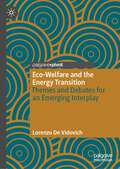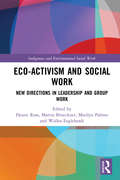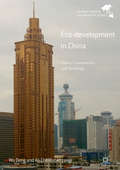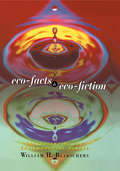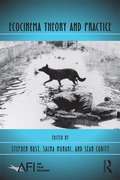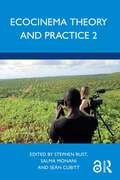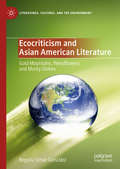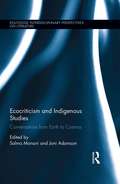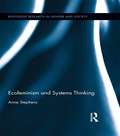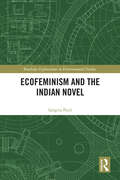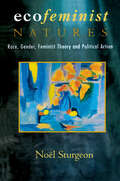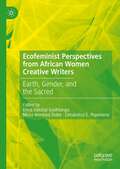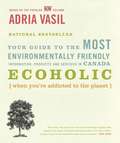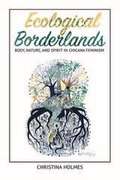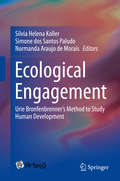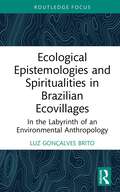- Table View
- List View
Eco-Socialism: From Deep Ecology to Social Justice
by David PepperFirst Published in 2004. Routledge is an imprint of Taylor & Francis, an informa company.
Eco-Sonic Media
by Jacob SmithThe negative environmental effects of media culture are not often acknowledged: the fuel required to keep huge server farms in operation, landfills full of high tech junk, and the extraction of rare minerals for devices reliant on them are just some of the hidden costs of the contemporary mediascape. Eco-Sonic Media brings an ecological critique to the history of sound media technologies in order to amplify the environmental undertones in sound studies and turn up the audio in discussions of greening the media. By looking at early and neglected forms of sound technology, Jacob Smith seeks to create a revisionist, ecologically aware history of sound media. Delving into the history of pre-electronic media like hand-cranked gramophones, comparatively eco-friendly media artifacts such as the shellac discs that preceded the use of petroleum-based vinyl, early forms of portable technology like divining rods, and even the use of songbirds as domestic music machines, Smith builds a scaffolding of historical case studies to demonstrate how "green media archaeology" can make sound studies vibrate at an ecological frequency while opening the ears of eco-criticism. Throughout this eye-opening and timely book he makes readers more aware of the costs and consequences of their personal media consumption by prompting comparisons with non-digital, non-electronic technologies and by offering different ways in which sound media can become eco-sonic media. In the process, he forges interdisciplinary connections, opens new avenues of research, and poses fresh theoretical questions for scholars and students of media, sound studies, and contemporary environmental history.
Eco-Teen Films (Routledge Advances in Film Studies)
by Robin L. Murray Joseph K. HeumannIlluminating the impacts of environmental disasters and climate crises globally, this book examines the experiences of teens grappling with eco-disasters and issues in films of the twenty-first century.With an emphasis on teen activism, international settings and filmmakers, and marginalized perspectives, this book showcases teens on film that are struggling with present and future everyday eco-disasters amplified by climate change. By highlighting and interrogating diverse genres of teen films in which young adults encounter, address, and battle environmental issues and calamities while also struggling with adolescent development, this book acknowledges the young adult point of view missing from most critical ecocinema research and underlines connections between the more complex ‘coming-of-age’ themes found in teen films with ecocinema themes and approaches. The films examined navigate increasingly realistic conditions, even in fantastical settings, as they showcase teens’ relationships with and responses to environmental issues and eco-disasters. Emphasizing teen activism and under-represented intersectional perspectives outside Hollywood, it establishes the eco-teen film as a notable subgenre.This book will be of interest to students and scholars of film studies, ecocriticism, and environmental studies, especially those with a particular interest in ecocinema and/or ecocritical readings of films.
Eco-Thoughts: Conversations with a Polluted Mind
by Anna Lisa TotaWhat if the pollution of the world did not only concern the environment in which we live, but also the flow of our thoughts in every moment of everyday life? What if those thoughts, invasive like locusts, could transform and become "eco-thoughts" that make us and others feel good? Ecology concerns us from the inside, passes through us, and literally shapes us: "what is inside is outside". This book offers "eco-words" and "eco-thoughts" as it sheds light on the traps that our minds construct for ourselves, that we so often fall into whether we mean to or not. It examines the erroneous paths that we sometimes meander down while we are thinking in our everyday lives in order to help us to identify and avoid them.The thoughts we formulate are not really ours, as if our mind prefers to flow in what has already been thought, lived, and felt. The author offers her reflections and insights to those who wish to direct their minds towards streams of thought that really do belong to us, that make us feel good. In order to do this, we must learn how to disable the “traps” and free ourselves of what is “contaminating” before they take hold and harm us.An original and thought-provoking examination of how are own internal lives can become toxic, and how to prevent this, that will be of particular value to students and scholars of sociology, philosophy, communication studies, memory studies, and social psychology.
Eco-Trauma Cinema (Routledge Advances in Film Studies)
by Anil NarineFilm has taken a powerful position alongside the global environmental movement, from didactic documentaries to the fantasy pleasures of commercial franchises. This book investigates in particular film’s complex role in representing ecological traumas. Eco-trauma cinema represents the harm we, as humans, inflict upon our natural surroundings, or the injuries we sustain from nature in its unforgiving iterations. The term encompasses both circumstances because these seemingly distinct instances of ecological harm are often related, and even symbiotic: the traumas we perpetuate in an ecosystem through pollution and unsustainable resource management inevitably return to harm us. Contributors to this volume engage with eco-trauma cinema in its three general forms: accounts of people who are traumatized by the natural world, narratives that represent people or social processes which traumatize the environment or its species, and stories that depict the aftermath of ecological catastrophe. The films they examine represent a central challenge of our age: to overcome our disavowal of environmental crises, to reflect on the unsavoury forces reshaping the planet's ecosystems, and to restructure the mechanisms responsible for the state of the earth.
Eco-Types: Five Ways of Caring about the Environment
by Emily Huddart KennedyWhy acknowledging diverse eco-social relationships can help us overcome the political polarization that undermines our ability to protect the environmentWhen we picture the ideal environmentalist, we likely have in mind someone who dedicates herself to reducing her own environmental footprint through individual choices about consumption—driving a fuel-efficient car, for example, or eating less meat, or refusing plastic straws. This is a benchmark that many aspire to—and many others reject. In Eco-Types, Emily Huddart Kennedy shows that there is more than one way to care about the environment, outlining a spectrum of eco-social relationships that range from engagement to indifference.Drawing on three years of interviews and research, Kennedy describes five archetypal relationships with the environment: the Eco-Engaged, often politically liberal, who have an acute level of concern about the environment, a moral commitment to protect it, and the conviction that an individual can make a difference; the Self-Effacing, who share the Eco-Engaged’s concerns but not the belief in their own efficacy; the Optimists, often politically conservative, who are confident in their relationship with the environment, doubt the severity of environmental problems, and resent insinuations that they don’t care; the Fatalists, who are pessimistic about environmental decline and feel little responsibility to adopt environment-friendly habits; and the Indifferent, who have no affinity for any part of the environmental movement.Kennedy argues that when liberals feel they have a moral monopoly on environmental issues, polarization results. If we are serious about protecting the planet, we must acknowledge that we don’t all need to care about the environment in the same way.
Eco-Urbanism and the South East Asian City: Climate, Urban-Architectural Form and Heritage
by Shireen Jahn Kassim Noor Hanita Abdul Majid Dzulkifli Abdul RazakThis book traces the history of urban design in tropical South East Asia with a view to offering solutions to contemporary architectural and urban problems. The book examines how pre-colonial forms and patterns from South East Asian traditional cities, overlaid by centuries of change, recall present notions of ecological and organic urbanism. These may look disorganised, yet they reflect and suggest certain common patterns that inform eco-urban design paradigms for the development of future cities.Taking a thematic approach, the book examines how such historical findings, debates and discussions can assist designers and policy makers to interpret and then instil identities in urban design across the Asian region. The book weaves a discourse across planning, urban design, architecture and ornamentation dimensions to reconstruct forgotten forms that align with the climate of place and resynchronise with the natural world, unearthing an ecologically benign urbanism that can inform the future.Written in an accessible style, this book will be an invaluable reference for researchers and students within the fields of cultural geography, urban studies and architecture.
Eco-Warriors: Understanding the Radical Environmental Movement, Updated Edition
by Rik ScarceEco-Warriors was the first in-depth look at the people, actions, history and philosophies behind the "radical" environmental movement. Focusing on the work of Earth First!, the Sea Shepherds, Greenpeace, and the Animal Liberation Front, among others, Rik Scarce told exciting and sometimes frightening tales of front-line warriors defending an Earth they see as being in environmental peril. While continuing to study these movements as a Ph.D. student, Scarce was jailed for contempt of court for refusing to divulge his sources to prosecutors eager to thwart these groups’ activities. In this updated edition, Scarce brings the trajectory of this movement up to date—including material on the Earth Liberation Front—and provides current resources for all who wish to learn more about one of the most dynamic and confrontational political movements of our time. Literate, captivating, and informative, this is also an ideal volume for classes on environmentalism, social movements, or contemporary politics.
Eco-Welfare and the Energy Transition: Themes and Debates for an Emerging Interplay
by Lorenzo De VidovichThis book provides a comprehensive overview of the emerging interplay that runs between energy – seen as a basic need and a providential material service from the viewpoint of welfare studies – and eco-welfare, seen as an emerging analytical and policy paradigm that hold together the social crisis on the one hand, and the ecological crisis, on the other hand. At a time of energy transition, the interplay between the theoretical framework of eco-welfare and the topic of energy supply is little explored, and therefore, this book fills a need in the literature by providing a comprehensive framework to navigate this emerging relationship. Such a framework is strengthened by insights on energy poverty and renewable energy communities, identified as cornerstones of the analysis between energy transition and eco-welfare.
Eco-activism and Social Work: New Directions in Leadership and Group Work (Indigenous and Environmental Social Work)
by Martin Brueckner Marilyn Palmer Dyann Ross Wallea EaglehawkSocial workers are called upon to shift from a human-centric bias to an ecological ethical sensibility by embracing love as integral to their justice mission and by extending the idea of social justice to include environmental and species justice. This book presents the love ethic model as a way to do eco-justice work using public campaigns, research, community arts practice and other nonviolent, direct action strategies. The model is premised on an active and ongoing commitment to the eco-values of love, eco-justice and nonviolence for the purpose of upholding the public interest. The love ethic model is informed by the stories of eco-activists who used nonviolent actions to address ecological issues such as: pollution; degradation of the environment; exploitation of farm animals; mining industry overriding First Nation Peoples’ land rights; and human health and social costs related to the natural resource industries, private land developments and government infrastructure projects. Informed by practice insights by activists from a range of eco-justice concerns, this innovative book provides new directions in social work and environmental studies involving transformational change leadership and dialogical group work between interest groups. It should be considered essential reading for social work students, researchers and practitioners as well as eco-activists more generally.
Eco-development in China: Cities, Communities And Buildings (Palgrave Series In Asia And Pacific Studies)
by Ali Cheshmehzangi Wu DengThis book explores China’s eco-development strategies and practices from a multi-scalar perspective, discussing the importance of interplay between multi spatial levels of the built environment, as well as the stakeholders who are key players for China’s eco-development. Based on a selection of eco-development Chinese case studies - eco-city, eco-community and eco-building - it highlights how specific eco initiatives and green features are applied and practiced, offering a guide to China’s strategy directions and design and planning trends. The book identifies gaps and strategies and solutions for future eco-development expected to take place in China in the coming decades, as well as useful references for eco-development in other countries, and provides a useful resource for studies in the fields of urbanism, sustainable development and eco-design.
Eco-facts and Eco-fiction: Understanding the Environmental Debate
by William H. BaarschersOzone-friendly, recyclable, zero-waste, elimination of toxic chemicals - such environmental ideals are believed to offer solutions to the environmental crisis. Where do these ideals come from? Is the environmental debate communicating the right problems? Eco-Facts and Eco-Fiction examines serious errors in perceptions about human and environmental health. Drawing on a wealth of everyday examples of local and global concerns, the author explains basic concepts and observations relating to the environment. Removing fear of science and technology and eliminating wrong perceptions lead to a more informed understanding of the environment as a science, a philosophy, and a lifestyle. By revealing the flaws in today's environmental vocabulary, this book stresses the urgent need for a common language in the environmental debate. Such a common language encourages the effective communication between environmental science and environmental decision-making that is essential for finding solutions to environmental problems.
Ecocinema Theory and Practice (AFI Film Readers)
by Sean Cubitt Stephen Rust Salma MonaniEcocinema Theory and Practice is the first collection of its kind—an anthology that offers a comprehensive introduction to the rapidly growing field of eco-film criticism, a branch of critical scholarship that investigates cinema’s intersections with environmental understandings. It references seminal readings through cutting edge research and is designed as an introduction to the field as well as a sourcebook. It defines ecocinema studies, sketches its development over the past twenty years, provides theoretical frameworks for moving forward, and presents eloquent examples of the practice of eco-film criticism through essays written by the field’s leading and emerging scholars. From explicitly environmental films such as Werner Herzong's Grizzly Man and Roland Emmerich's The Day After Tomorrow to less obvious examples like Errol Morris's Fast, Cheap & Out of Control and Christopher Nolan's Inception, the pieces in this collection comprehensively interrogate the breadth of ecocinema. Ecocinema Theory and Practice also directs readers to further study through lists of recommended readings, professional organizations, and relevant periodicals.
Ecocinema Theory and Practice 2
by Stephen Rust Monani Salma Cubitt SeánThis second volume builds on the initial groundwork laid by Ecocinema Theory and Practice by examining the ways in which ecocritical cinema studies have matured and proliferated over the last decade, opening whole new areas of study and research. Featuring fourteen new essays organized into three sections around the themes of cinematic materialities, discourses, and communities, the volume explores a variety of topics within ecocinema studies from examining specific national and indigenous film contexts to discussing ecojustice, environmental production studies, film festivals, and political ecology. The breadth of the contributions exemplifies how ecocinema scholars worldwide have sought to overcome the historical legacy of binary thinking and intellectual norms and are working to champion new ecocritical, intersectional, decolonial, queer, feminist, Indigenous, vitalist, and other emergent theories and cinematic practices. The collection also demonstrates the unique ways that cinema studies scholarship is actively addressing environmental injustice and the climate crisis. This book is an invaluable resource for students and scholars of ecocritical film and media studies, production studies, cultural studies, and environmental studies.
Ecocriticism and Asian American Literature: Gold Mountains, Weedflowers and Murky Globes (Literatures, Cultures, and the Environment)
by Begoña Simal-GonzálezEcocriticism and Asian American Literature: Gold Mountains, Weedflowers, and Murky Globes offers an ecocritical reinterpretation of Asian American literature. The book considers more than a century of Asian American writing, from Eaton’s Mrs. Spring Fragrance (1912) to Ozeki's A Tale for the Time Being (2013), through an ecocritical lens. The volume explores the most relevant landmarks in Asian American literature: the first-contact narratives written by Bulosan, Kingston, Mukherjee, and Jen; the controversial texts published by Sui Sin Far (Edith Eaton) at the time of the Yellow Peril; the rise of cultural nationalism in the 1970s and 1980s, illustrated by Wong’s Homebase and Kingston’s China Men; old and recent examples of “internment literature” dealing with the incarceration of Japanese Americans during WWII (Sone, Houston, Miyake, Kadohata); and the new trends in Asian American literature since the 1990s, exemplified by Yamashita’s and Ozeki’s novels, which explore the challenges of our transnational, transnatural era. Begoña Simal-González’s ecocritical readings of these texts provide crucial interdisciplinary insights, addressing and analyzing important narratives within Asian American culture and literature.
Ecocriticism and Indigenous Studies: Conversations from Earth to Cosmos (Routledge Interdisciplinary Perspectives on Literature)
by Joni Adamson Salma MonaniThis book addresses the intersections between the interdisciplinary realms of Ecocriticism and Indigenous and Native American Studies, and between academic theory and pragmatic eco-activism conducted by multiethnic and indigenous communities. It illuminates the multi-layered, polyvocal ways in which artistic expressions render ecological connections, drawing on scholars working in collaboration with Indigenous artists from all walks of life, including film, literature, performance, and other forms of multimedia to expand existing conversations. Both local and global in its focus, the volume includes essays from multiethnic and Indigenous communities across the world, visiting topics such as Navajo opera, Sami film production history, south Indian tribal documentary, Maori art installations, Native American and First Nations science-fiction literature and film, Amazonian poetry, and many others. Highlighting trans-Indigenous sensibilities that speak to worldwide crises of environmental politics and action against marginalization, the collection alerts readers to movements of community resilience and resistance, cosmological thinking about inter- and intra-generational multi-species relations, and understandings of indigenous aesthetics and material ecologies. It engages with emerging environmental concepts such as multispecies ethnography, cosmopolitics, and trans-indigeneity, as well as with new areas of ecocritical research such as material ecocriticism, biosemiotics, and media studies. In its breadth and scope, this book promises new directions for ecocritical thought and environmental humanities practice, providing thought-provoking insight into what it means to be human in a locally situated, globally networked, and cosmologically complex world.
Ecofeminism and Systems Thinking (Routledge Research in Gender and Society #36)
by Anne StephensThis book brings together two vitally important strands of 20th-century thinking to establish a set of simple and elegant principles for planning, project design and evaluation. It explains the backgrounds of cultural ecofeminism and critical systems thinking, and what we find when they are systematically compared. Both theories share a range of concepts, have a strong social justice ethic, and challenge the legacy of modernity. The book takes theory into practice. The value of the emergent principles of feminist-systems thinking are described and demonstrated through four chapters of case studies in community development settings. The principles can be used to influence project design and outcomes across a range of disciplines including project management, policy, health, education, and community development. This book has much to offer practitioners who seek to create more socially just and equitable project and research outcomes.
Ecofeminism and the Indian Novel (Routledge Explorations in Environmental Studies)
by Sangita PatilEcofeminism and the Indian Novel tests the theories of ecofeminism against the background of India’s often different perceptions of environmental problems, challenging the hegemony of Western culture in thinking about human problems. This book moves beyond a simple application of the concepts of ecofeminism, instead explaining the uniqueness of Indian novels as narratives of ecofeminism and how they can contribute to the development of the theory of ecofeminism. In examining a selection of novels, the author argues that Indian texts conceptualize the ecological crisis more as a human problem than as a gender problem. The book proposes that we should think of ecofeminism as ecohumanism instead, seeing human beings and nature as a part of a complex web. Novels analysed within the text include Kamala Markandaya’s Nectar in a Sieve (1954), Shivram Karanth’s Return to Earth (2002) and Na D’Souza’s Dweepa (2013). Ecofeminism and the Indian Novel will be of great interest to students and scholars of ecofeminism, ecocriticism, ecological feminism, environmental humanities, gender studies, ecological humanities, feminist studies and Indian literature.
Ecofeminist Approaches to Early Modernity
by Jennifer Munroe Rebecca LarocheChallenges the notion of how early modern women may or may not have spoken for (or even with) nature. By focusing on various forms of 'dialogue,' these essays shift our interest away from speaking and toward listening, to illuminate ways that early modern Englishwomen interacted with their natural surroundings.
Ecofeminist Natures: Race, Gender, Feminist Theory and Political Action
by Noel SturgeonExamining the development of ecofeminism from the 1980s antimilitarist movement to an internationalist ecofeminism in the 1990s, Sturgeon explores the ecofeminist notions of gender, race, and nature. She moves from detailed historical investigations of important manifestations of US ecofeminism to a broad analysis of international environmental politics.
Ecofeminist Perspectives from African Women Creative Writers: Earth, Gender, and the Sacred
by Enna Sukutai Gudhlanga Musa Wenkosi Dube Limakatso E. PepeneneThis volume explores contemporary African women’s creative writing, highlighting their contributions to ecofeminist theology. Contributors address the following questions: How do contemporary African women writers depict the Earth/land/environment and its relationship to women in various contexts? How is religion featured in African women’s writing? How does religious literature (scriptures) form an intertextual layer in African women’s writing? The contributors proceed by analyzing the intersection of religion, gender, class, sexuality, colonialism, and ecology in selected texts written by African women. They bring these texts into conversation with broader eco-feminist theological scholarship, exploring the potential of literary writing to contribute to theological discourse of liberation and social justice in the African and global arena.
Ecoholic: Your Guide to the Most Environmentally Friendly Information, Products and Services in Canada
by Adria VasilWhen the world’s environmental woes get you down, turn toEcoholic– Canada’s best resource for practical tips and products that help you do your part for the earth. You’ll get the dirt on what not to buy and why, and the dish on great gifts, clothes, home supplies and more. Based on the popular and authoritative "Ecoholic" column that appears weekly inNOW,Ecoholicis a cheeky and eye-opening guide to all of life’s greenest predicaments. The Best Green Products For the home: cleaning and laundry supplies, furniture, linens For renovations: flooring, paint, insulation, carpets, cabinetry For the kitchen: cookware, appliances For your body: cool clothes, jewellery, shoes, beauty care For baby: toys, cribs, organic food, diapers For the garden: fertilizer, pest control, patio furniture For the office: supplies, equipment, energy savings For your pet: natural food, flea control, litter solutions For the fun of it: sporting goods, camping equipment, holidays The Most Current Information Avoiding toxins in the home Buying pesticide-free food Sustainable seafood, meat and veggie choices Reducing energy and water use Greening your love life Eco-tourism Keeping your home and garden pest-free without harmful chemicals Green gift-giving and ethical investing Choosing an environmentally friendly career The big issues facing Canada and how to get involved The Most Helpful Services Electronics and computer recyclers Alternative energy suppliers Green general stores Local organic food delivery Incentives and rebates for greening your home Local and national environmental groups Household hazardous waste disposal Also includes a city-by-city guide: Calgary, Halifax, Montreal, Ottawa, Toronto, Vancouver, Winnipeg
Ecological Borderlands: Body, Nature, and Spirit in Chicana Feminism
by Christina HolmesEnvironmental practices among Mexican American woman have spurred a reconsideration of ecofeminism among Chicana feminists. Christina Holmes examines ecological themes across the arts, Chicana activism, and direct action groups to reveal how Chicanas can craft alternative models for ecofeminist processes. Holmes revisits key debates to analyze issues surrounding embodiment, women's connections to nature, and spirituality's role in ecofeminist philosophy and practice. By doing so, she challenges Chicanas to escape the narrow frameworks of the past in favor of an inclusive model of environmental feminism that alleviates Western biases. Holmes uses readings of theory, elaborations of ecological narratives in Chicana cultural productions, histories of human and environmental rights struggles in the Southwest, and a description of an activist exemplar to underscore the importance of living with decolonializing feminist commitment in body, nature, and spirit.
Ecological Engagement: Urie Bronfenbrenner’s Method to Study Human Development
by Silvia Helena Koller Simone dos Santos Paludo Normanda Araujo de MoraisThis book presents the method developed by Dr. Silvia Helena Koller and her students and collaborators to apply Urie Bronfenbrenner’s Bioecological Theory of Human Development to empirical studies with children and adolescents. Although Bronfenbrenner's theory, in different stages of development, has been widely cited by several researchers, surprisingly little has been written about the theory itself, its evolution or about the methods that should be used to test it. This book fills this gap by presenting both an overview of Bronfenbrenner’s theory and a method to apply it to empirical research, the Ecological Engagement method.The book also shows how this method can be applied in practice by bringing together a series of research reports of studies carried out in different regions of Brazil and in Angola that used the Ecological Engagement method to study children and adolescent development in different contexts, such as street situation, sexual exploitation, institutional reception, family reintegration, school and emergency and disasters, among others.Ecological Engagement – Urie Bronfenbrenner’s Method to Study Human Development will be a valuable tool for psychologists and other social scientists interested in child and adolescent development looking for a solid an innovative methodology that allows researchers to directly interact with their research subjects in their own social contexts in order to fully understand their problems and issues. “The methodology of Ecological Engagement, that is explained and richly empirically illustrated in this book, is a singularly significant extension of [Urie Bronfenbrenner’s] bioecological model. Indeed, in my view it is a brilliant empirical instantiation of the PPCT component of the model. (…) Ecological Engagement methodology is the scientific means through which Urie’s legacy can be furthered.” – Excerpt from the Foreword to the International Edition by Dr. Richard M. Lerner, director of the Institute for Applied Research in Youth Development, Tufts University
Ecological Epistemologies and Spiritualities in Brazilian Ecovillages: In the Labyrinth of an Environmental Anthropology (Routledge Environmental Anthropology)
by Luz Gonçalves BritoThis book brings together ethnographic field research on four permacultural ecovillages in Brazil to highlight the importance of spirituality and ecological epistemologies as key analytical tools. It demonstrates that ecological spirituality can, and should, be understood beyond the dichotomy of personal and political, between people and nature, in the field of environmental anthropology. The book uses a broad philosophical methodology based on the phenomenological theories of Maurice Merleau-Ponty, Tim Ingold and Alfred Schutz combined with post-structuralist conceptions of the relationship between person and world, individual and society. The field research consisted of ethnographic travel, observation and recorded dialogue with individuals based in each ecovillage: Arca Verde, situated in Campos de Cima da Serra; Vrinda Bhumi, a Vaishnava ecovillage in Baependi-MG; Goura Vrindavana, a Vaishnava ecovillage in Paraty-RJ; and Muriqui Assu Ecovillage Project, a secular ecovillage in Niterói-RJ. Throughout the book ethnographic research is woven together with poetic interludes, images, personal narrative experience and phenomenological theory, bringing a new understanding and approach to environmental anthropology as a discipline. Including a Preface written by Tim Ingold, it will appeal to academics, researchers and upper-level students in phenomenology, environmental philosophy, environmental anthropology, religious studies and social sciences more broadly.
